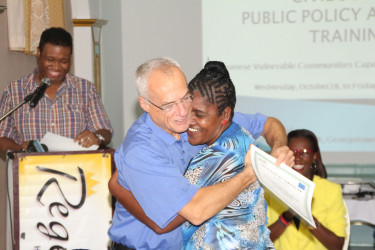Twenty-six advocates are now better equipped to engage policy makers as a result of training provided by the Society Against Sexual Orientation Discrimina-tion (SASOD) in partnership with the Guyana Equality Forum (GEF).
The two-part programme educated members of civil society on public policy advocacy. Managing Director of SASOD Joel Simpson told Stabroek News that the first part taught participants the basics of public policy advocacy and the fundamental principles. During this phase participants were also introduced to the strategic enquiry process which requires that “certain kinds of research and certain kinds of engagement are pursued in order to inform the development of your advocacy strategy,” Simpson explained.

He noted that at the end of this phase, which was conducted in September, everyone was given an assignment. They were tasked with interviewing key stakeholders and reporting the information they found to the trainers.
The participants of the programme will now continue to advocate on four issues. These issues are the inclusion of human rights and equality issues in gender policy slated to be in place by April 2016; the inclusion of sexual orientation and gender identity in the 1997 Prevention of Discrimination Act; the decriminalisation of same sex intimacy between adult men in private and decriminalisation of cross dressing as well as greater access to mental, physical and sexual health services in hinterland communities.
Simpson acknowledged that the issues identified concern several ministerial portfolios, while noting that several ministers have acknowledged the importance of addressing discrimination against members of the LGBTI community.
“Our representative Ernestine Leonard is presently participating in the youth consultation on draft gender policy at the Ministry of Social Protection. Minister of Governance Raphael Trotman acknowledged it at level of UN Committee on Economic, Social and Cultural Rights. At the Social Cohesion roundtable, Minister [Amna] Ally, in her address said that one of social equality issues we have to deal with is discrimination based on sexual orientation and that is without being questioned and provoked. Also, whenever Prime Minister Moses Nagamootoo is asked anything about constitutional reform, he always brings up that sexual orientation as grounds for discrimination within the constitution as one of the issues that we have to address in any reform we undertake,” Simpson said.
Though he is encouraged by this official acknowledgement, he is hoping for the prioritisation of the implementation of these recommendations.
“It is noteworthy that government has acknowledged these issues within the first six months of taking office. That is a progressive step; that government recognises this as an issue but it has to be prioritised for implementation. While we are hearing that the conversation will come up eventually… we note that it is not being considered a priority issue; that is where the slippage might come,” he said.
In fact, Simpson feels that if the issues are not addressed soon they will not be addressed at all. “If it is not addressed in first 18 months in office… and they don’t change the law by the end of 2016, then it probably won’t be done in their five-year term. It really needs to be done in the first 18 months,” he stressed
Head of the Delegation of the European Union to Guyana Ambassador Jernej Videtic delivered the feature address, in which he congratulated SASOD, GEF, the trainers and participants.
He said the EU was proud to provide financial support for the programme as the protection of vulnerable groups is part of human rights agenda of EU and advocacy is an important part of the process of offering protection.
Civil society, he said, is best positioned to inform and guide public policy in this area. He expressed the hope for the development of a dynamic public forum which is dedicated to collectively promoting the rights of marginalised groups.
The completed programme, he noted is a good example of partnership and coexistence which will benefit all NGOs and lead to the creation of a strong society in which all citizens are equal and treated without discrimination.





